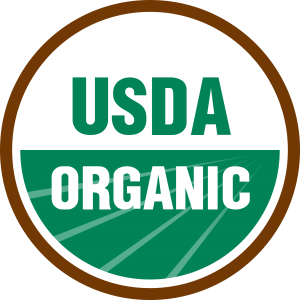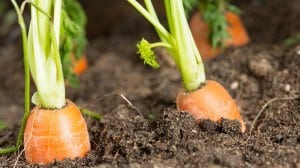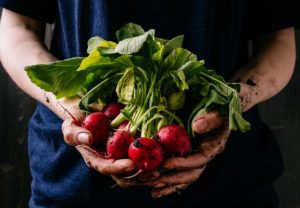Organic food is in danger of losing its meaning, so farmers and activists rallied today to stop corporate  interests from destroying the last vestiges of ethical organic farming. Corporate lobbyists are pushing the National Organic Standards Board to include hydroponic production in the Organic label. While the details can seem esoteric, the implications are already rippling through the food system.
interests from destroying the last vestiges of ethical organic farming. Corporate lobbyists are pushing the National Organic Standards Board to include hydroponic production in the Organic label. While the details can seem esoteric, the implications are already rippling through the food system.
The Organic Label has come to be synonymous with good, wholesome, ethically raised food that is grown by people, not simply a mechanized process. Soil, like our microbiome, is a complex ecosystem that when healthy, produces high-quality, nutritious fruits, vegetables, and animal forage and feed. In addition, mechanized processes like hydroponic production can significantly negatively impact rural communities by taking humans — and their jobs — out of the equation. This destroys communities by reducing the demand (and eventually the supply) for essential services like healthcare, food supplies, and even communication networks like the internet and radio.
Organic sales are experiencing double digit growth and buyers are increasingly more mainstream, according to the USDA. These consumers may not be well-informed and will be easily confused by a label that is expected to mean one thing and in reality represents quite another. The price differential also remains high, and a change like this could mean buyers aren’t getting what they’ve paid for.
Quotes
“Today, we are gathering to protect and make our voice heard for a system of agriculture developed by people whom I consider the salt of the earth – our organic farmers, who grow nourishing food for us every day. Our organic food is under threat yet again by large corporate interests who want to cheapen our food supply and steal what has been created by the People – Organic. What they want to call organic – hydroponically-grown food – is not organic. Organic food is grown in the soil – always has been and now we need to make our voice heard so that it always will be. Now is the opportunity for humanity to build our new systems of living on planet Earth, starting from where we began – the soil.” – Lisa Stokke, Executive Director of ?Next7.org
“So the thing that I think we need to understand more fully in our organic movement today is that it’s ultimately about the soil. The soil is what is the foundation of organic agriculture. And the reason for that is because soil is not just dirt as it is often assumed in our culture today. Soil is actually a living community. There are more microbes in a single tablespoonful of soil like this than there are humans on the planet – so billions of microbes -and it’s those microbes that provide all of the benefits from the food that we grow on soil.” – Fred Kirschenmann, organic farmer for 37 years, President of Stone Barns, New York; Distinguished Fellow, Leopold Center for Sustainable Agriculture, Iowa
“Hydroponic growers need to get their own label. Organic is about soil health and nutrition made possible by thriving soil biology rather than constant man-made inputs. You cannot replace that with hydroponics. The agriculture that we support is our legacy. Future generations need healthy soil to sustain life. In order to have any farmland left in 50 years, the USDA organic standards need to be stronger NOT weaker. We can and we must build soil. We need living roots in the ground to draw down carbon and to feed the soil food web.” – Cat Buxton, VT organic farmer, Cedar Circle Farm in East Thetford
“Most organic growers would not consider a tomato grown in a little bag of coconut husk suspended 3 feet over the ground and fed entirely through an IV drip system to be organically grown. Virtually all of the tomatoes labeled as ‘Organic’ in large chain stores (such as Wal-Mart) will soon be hydroponic tomatoes from Mexico and California. People might not realize they are buying factory food that has never touched the soil.” – VT organic farmer Dave Chapman
“For over one hundred years, organic farming has been synonymous with nurturing the soil and thereby providing the success of organic farmers in growing strong, healthy plants and nutritionally superior food. Soil-less, artificial production, regardless of how politically powerful Industrial Hydroponics may be, has no place in honest organic. And it never will.” – Jim Gerritsen, ME organic farmer, Wood Prairie Farm; president, Organic Seed Growers and Seed Association, Bridgewater
“The upcoming National Organic Standrads Board (NOSB) vote on the Crops Committee’s proposal to ban hydroponics for the second time is one of the most important votes to be taken by the NOSB. The National Organic Program (NOP) ignored the NOSB 2010 vote and illegally allowed certification of soilless hydroponic farms. Now there is a national movement to Keep the Soil in Organic with farmers and eaters outraged. The NOSB members can uphold the Organic Farm Production Act rules on the soul of organics being living soil or they can continue the fraud of allowing soilless hydroponic certification. A no vote or postponing a vote will push long time organic farmers like me to say good bye to the industrial loving , fraud permitting NOP and form a new certification program that honors authentic organic farmers.” – VT organic farmer David Miskell
“Most of the righteous aspects about organic farming have been rediscovered by studying the past. The foundation of our heritage was built when we turned our backs to toxic modernity with its dependence on poisonous synthetic chemicals and permissive livestock practices that do the planet much more harm than good. Seventy years ago the future of farming was not promising and very little except traditional organic farming has given us much hope. Hydroponic organic production is promoted for the same kind of benefits the public was promised through green-revolution, overabundance and the “precision” of chemical agriculture. If hydroponics is so fantastic, then it shouldn’t have to lean on the organic label to gain acceptance. The hydroponic industry should do just as we have had to do: establish their own legitimacy without outside help. Leave us to our cover crops and wildlife corridors and truly natural accommodation with the environment. Don’t steal something that doesn’t belong to you.” – Steve Sprinkel, organic farmer since 1975 and president of Cornucopia Institute
“Organic is all about farming in harmony with nature – nutritionally balanced foods from healthy soils and vibrant ecosystems. Hydroponic is an industrial model, totally dependent on outside nutrient and energy inputs. It may be fine, but its not organic! Companies that are labeling hydroponically-grown products as “organic” must be exposed, so that buyers can make informed choices to support bona fide organic farms. After all, soil is the soul of organic!” – Jim Riddle, former NOSB member
“The vitality, diversity, and complexity of soil are indispensable to healthy, organic food production. Nutrient dense food requires soil and all the rich interactions that take place below ground and out of sight. Human health and soil health and ecosystems health are all intimately tied together. Organic food production recognizes all these diverse interactions and accepts no short cuts. Soil health is human population health and planetary health.” – ME farmer Sam May




